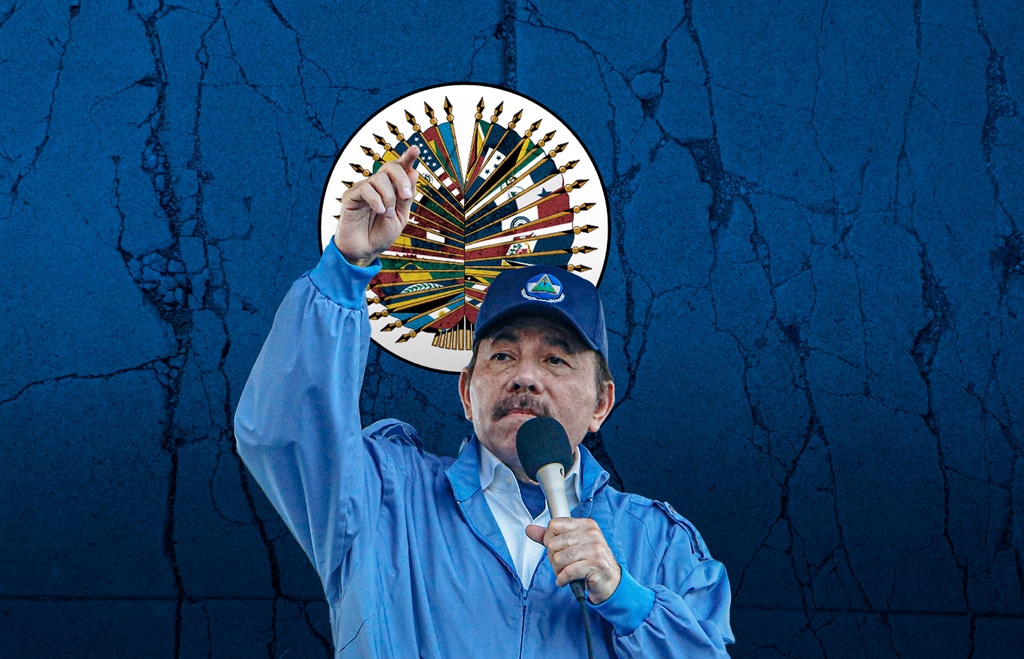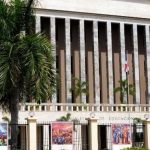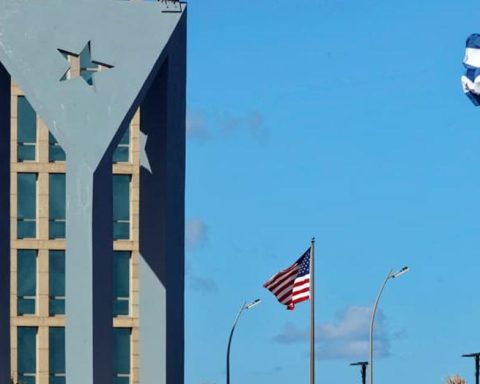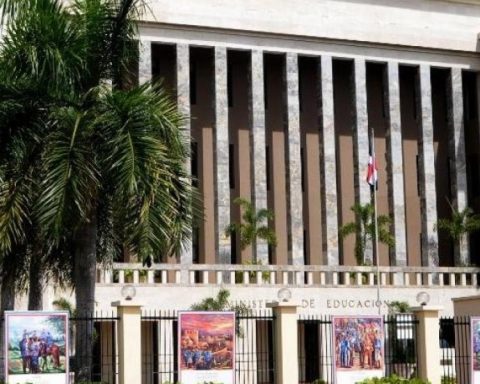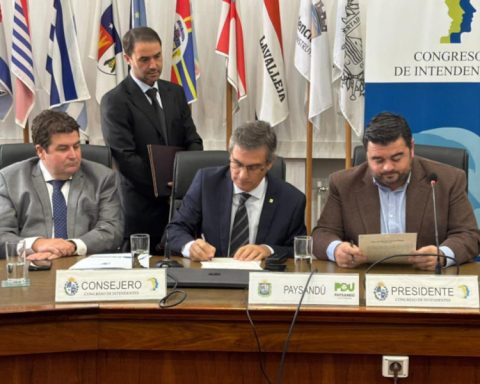Eight countries of the continent will propose to the rest of the Member States of the Organization of American States (OAS) to condemn “strongly” the hunt undertaken by the Ortega regime against organized civil society, and the priests and bishops of the Nicaraguan Catholic Church, according to the draft of a resolution on the political and human rights crisis in Nicaragua, which this Friday will be discussed by the Permanent Council of the regional organization.
This draft was proposed by the representation of Antigua and Barbudawith the support of the delegations of Canada, Costa Rica, Chile, Dominican Republic, Peru, United States and Uruguay.
The document “strongly condemns the forced closure of non-governmental organizations and the harassment and arbitrary restrictions on religious organizations and those who criticize their actions in Nicaragua.”
It also refers to its “insistence that the Government of Nicaragua immediately release all political prisoners and cease the harassment and intimidation of the independent press and guarantee the exercise of the right to freedom of expression.”
These points established in the draft refer to the most recent repressive acts perpetrated by the regime, such as the de facto kidnapping and imposition “house by jail” against eleven faithful Catholics —six priests, two seminarians, a chorister and two cameramen— “kidnapped” by the regime in the Episcopal Curia of Matagalpa.
At the head of the group of “kidnapped” is Monsignor Rolando José Álvarez, bishop of the Diocese of Matagalpa and apostolic administrator of the Diocese of Estelí, and the priests: José Luis Díaz and Sadiel Eugarrios, first and second vicar of the San Pedro Cathedral, respectively; Óscar Escoto, parish priest of the Santa María de Guadalupe church; Ramiro Tijerino, rector of the John Paul II University and in charge of the San Juan Bautista parish; and Raul Gonzalez.
In addition, this Tuesday the National Assembly —dominated by the Sandinista Front— eliminated another hundred Non-Profit Organizations (NPOs), bringing the canceled NGOs to 1,306 so far in 2022. From 2018 to date, the figure is 1380 illegal organizations.
The regime has only authorized nine visits to the political prisoners of El Chipotecaptured in the context of the 2021 general elections. Their relatives have denounced the physical damage suffered by prisoners of conscience due to torture and cruel treatment, permanent isolation and solitary confinement, and the lack of specialized medical attention.
As the motion for a resolution points out, attacks against the independent press have intensified in the country. Recently, the newspaper La Prensa, the oldest in Nicaraguareported that its newsroom was forced into exile after a hunt unleashed by the regime due to the newspaper’s coverage of the expulsion of 18 Missionaries of Charity nuns.
First vote on crisis in Nicaragua in 2022
This will be the first time in 2022 that the OAS Permanent Council votes on a resolution on the political and human rights crisis in Nicaragua.
The last time the Permanent Council made a specific statement on the crisis in Nicaragua it was December 8, 2021when a resolution was approved that urgently demanded that the regime of Daniel Ortega and Rosario Murillo release all political prisoners and accept a high-level mission to reach an agreement, given that “Nicaragua does not is fulfilling the commitments assumed in the Inter-American Democratic Charter”.
The approval of the resolution was given with the vote of a majority of 25 countries in favor. Eight countries abstained and one voted against (Nicaragua). The nations that supported the resolution were Costa Rica, El Salvador, Guatemala, Panama, Canada, United States, Chile, Colombia, Peru, Uruguay, Paraguay, Brazil, Ecuador, Guyana and Suriname. Dominican Republic, Jamaica, Venezuela, Bahamas, Barbados, Haiti, Antigua and Barbuda, Trinidad and Tobago, Grenada and Dominica.
The countries that abstained were: Belize, Bolivia, Honduras, Mexico, Saint Lucia, Saint Kitts and Nevis, and Saint Vincent and the Grenadinesyes
Nevertheless, the Ortega regime did not respond to OAS requests to agree on the coming of a high-level mission made by Secretary General Luis Almagro. “Proceedings were made at all levels. Communications were sent to Commander-in-Chief Daniel Ortega himself, and institutional contacts were also made at the highest level with the Nicaraguan Foreign Ministry and its dependencies. Consultations were also made through political channels at the highest level and through the General Secretariat. Also through the Nicaraguan missions to the OAS,” the diplomat reported.
“From the steps taken, approval has not been received for the sending of the high-level good offices mission; that is, no formal response has been received in this regard,” the Uruguayan diplomat stressed.
Prior to this resolution; on November 12, 2021, after the votes that Ortega and Murillo gave themselves to prescribe themselves five more years in power, the OAS General Assembly of Foreign Ministers He ruled on this process that was carried out without transparency, political competition and under the shadow of political violence.
25 countries approved that day a resolution that declared November 7 votes “without legitimacy”. Seven countries abstained (Mexico, Honduras, Belize, Bolivia, Dominica, Saint Vincent and the Grenadines and Saint Lucia), there was one vote against, which was that of the delegation of Nicaragua and the “absent” country, Saint Kitts and Nevis.
The ocupation “military manual” of the OAS in Managua
On May 13, 2022, the OAS Permanent Council voted on a resolution regarding Nicaragua, but it was for condemn the occupation military manual of the Office of the regional organization in Managua ordered by the Ortega regime.
The resolution was also presented by the Permanent Representative of Antigua and Barbuda, Ambassador Ronald Michael Sanders, and was supported by 29 delegations, including: Canada, Brazil, Chile, Colombia, United States, Grenada, Uruguay, Costa Rica, Mexico and Argentina.
There were no votes against, but the delegations of Saint Vincent and the Grenadines, Honduras and El Salvador abstained from voting. In addition, the representations of Bolivia and Nicaragua were absent.
Regime ignores requests from the OAS
The draft resolution establishes that the Permanent Council of the OAS “renews its offer so that the Government of Nicaragua commits to adhere to the guiding charters of the OAS, the reestablishment of democratic institutions and respect for the human rights of accordance with international law”.
The Secretary General of the OAS, Luis Almagro, will be in charge of presenting the results of the vote on this resolution to the Government of Nicaragua so that it can be carried out.
However, the Ortega regime maintains a policy of “zero communication” with the OAS, while advances its process of leaving the regional organizationwhich began a few days after the General Assembly of Foreign Ministers that declared the general elections of that year “without illegitimacy”.
